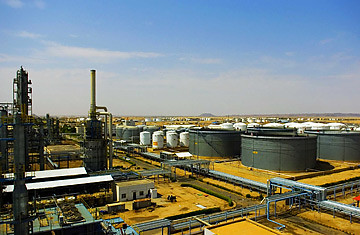
Sudan oil refinery where the newly-emerging oil-rich central African state has been under fire from U.S. imperialism for years. The leadership of the country is being hounded by the ICC which it is not a party to the Rome Statute., a photo by Pan-African News Wire File Photos on Flickr.
South Sudan Calls Sudan Oil Blockade Intimidation
November 29, 2011, 9:12 AM EST
By Jared Ferrie and Salma El Wardany
Nov. 29 (Bloomberg) -- South Sudanese Oil Minister Stephen Dhieu Dau rejected Sudan’s blockade of its crude exports as an “intimidation tactic.”
The authorities in Khartoum owe South Sudan $5 billion in arrears for shipments before it gained independence and taxes and other revenue collected since then, he said today in a phone interview from Addis Ababa, the Ethiopian capital. Sudan’s government announced yesterday it halted exports by South Sudan, claiming it’s owed $727 million for earlier shipments.
“It’s a figure that has no basis,” Dau said. “This is actually an intimidation tactic so that in the negotiations South Sudan would panic.”
African Union-sponsored negotiations between the two countries began in Addis Ababa on Nov. 21 over issues including the oil fees the south should pay to ship crude through the north and the disputed region of Abyei. While South Sudan took control of about three-quarters of the former state’s output of 490,000 barrels a day when it seceded on July 9, it relies on the north for access to refining and an export terminal on the Red Sea.
“Sudan is trying to make the south pay for its economic failure by increasing fees on oil,” Fouad Hikmat, the special adviser on Sudan for the Brussels-based International Crisis Group, said today by phone from Addis Ababa. “The north is trying to use threats as a pressuring tactic on the south during the ongoing negotiations.”
Share Seizure
The halt to exports comes after South Sudan announced in a presidential decree on Nov. 8 that it seized the shares held by Sudapet, Sudan’s state-owned petroleum company, in joint operations with companies including China National Petroleum Corp., Malaysia’s Petroliam Nasional Bhd and India’s Oil & Natural Gas Corp.
China today urged the two sides to reach agreement in negotiations.
“Maintaining normal production of oil is important to both South Sudan and Sudan,” Chinese Foreign Ministry spokesman Hong Lei told reporters today in Beijing. “We hope North and South Sudan can stay rational, show restraint, and resolve relevant problems through neighborly pragmatism and friendly talks.”
South Sudan’s deputy petroleum minister, Elizabeth Bol, said yesterday the blockade prevented a shipment of 600,000 barrels of Nile-blend crude from being delivered to China International United Petroleum & Chemical Corp. A shipment of 1 million barrels of Dar blend oil to Geneva-based Vitol SA may also be at risk if the blockade continues, she said.
China Concerned
“China is very pragmatic and the statement means it’s really concerned what Sudan did and about the stability in the region which might harm the interests of Chinese investment,” he said.
South Sudan’s government is studying the feasibility of building a new pipeline to export oil via its East African neighbours, rather than using Sudan’s oil pipeline that runs to Port Sudan on the Red Sea, the government said last week.
Southern officials have said previously they are considering building a pipeline that would carry crude to the Kenyan port of Lamu.
--With assistance from William Bi in Beijing. Editors: Karl Maier, Paul Richardson
To contact the reporters on this story: Jared Ferrie in Juba, South Sudan, at jferrie1@bloomberg.net; Salma El Wardany in Khartoum at selwardany@bloomberg.net
To contact the editor responsible for this story: Antony Sguazzin at asguazzin@bloomberg.net
No comments:
Post a Comment